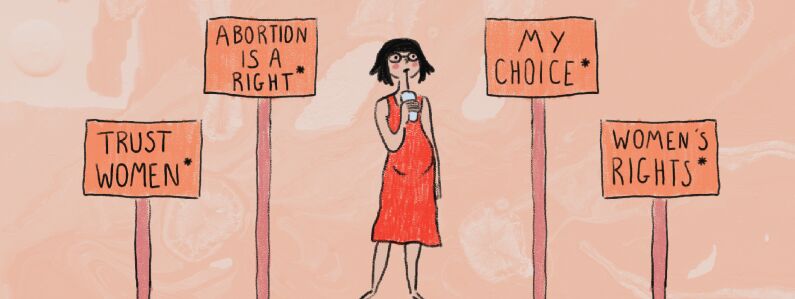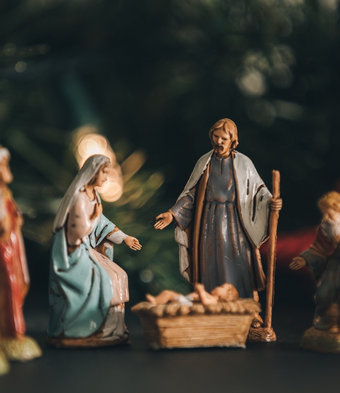Should abortion ever be a criminal offence?

This week saw Carla Foster, a 44-year old mum of three sent to prison for illegally procuring an abortion. During the first covid-19 lockdown, she lied during her telemedicine consultation and the British Pregnancy and Advisory Service (BPAS), sent her abortion pills in the post. On 9 May, she took the first pill and on 11 May 2020, she took the second one. Later that afternoon, she called paramedics, but failed to tell them she was pregnant, so they left. Later still, she called paramedics again having given birth to Baby Lily. She was actually 8 months old, around 32-34 weeks and well past the legal limit for having an abortion. Tragically, despite attempts at resuscitation, Baby Lily was pronounced dead.
When Ms Foster was first in court, she entered a not guilty plea. This was subsequently changed to a guilty plea. In his sentence, Justice Pepperell said the fact Ms Foster had lied on several occasions and had initially entered a not guilty plea all influenced his decision to send her to prison. But the main reason is because she broke the law. He also acknowledged in his judgement that she felt deep and genuine remorse and distress over her actions.
Following the sentencing, some MPs like Caroline Nokes and Stella Creasey have been calling for the law to be changed to remove abortion out of criminal law entirely. This is commonly called the ‘decriminalisation’ of abortion. BPAS have promised to use every avenue open to them to secure this law change. Meanwhile, current abortion law (among the most permissive in the world) is described as ‘archaic’.
All of this raises a fundamental question: should abortion ever be a criminal offence? Some have been very vocal this week in arguing: no, abortion should never involve women being put in prison. They've said the current law (which says after 24 weeks you can't have an abortion and you could be imprisoned), needs to change. In fact, they want abortion removed entirely from criminal law because it's just a 'healthcare issue'.
At CARE, we see things differently. Abortion is not simply a healthcare issue because it involves the taking of a life. On the face of it, decriminalisation might seem a fair, even kind approach. But it’s vital we understand what it would actually mean. The more you look into it, the more you realise there are very good reasons to oppose the decriminalisation of abortion. In fact, even if you think abortion itself should be legal, that doesn't mean you have to join BPAS and some MPs on their latest crusade to ensure abortion becomes all the most widely available.
To help us grapple with this, here are three things the abortion lobby won’t tell you about the decriminalisation of abortion.
1. Women are not being made into criminals under the current law
BPAS, Britain’s second largest abortion provider, have been campaigning for some time for decriminalisation. Their campaign hinges on the idea that women are currently being made into criminals if they have an abortion outside the scope of the law. They have ramped up these efforts, releasing a video entitled ‘Smile, You’re Knicked’, in which a hoard of police officers burst into a woman’s home, as if she is a dangerous kingpin at the centre of a drug trafficking network, and arrest her for possession of abortion pills.
An alarming idea, but utterly false.
The law is often a very different thing on its face than it is in its practical outworking, particularly when it comes to criminal law. The current law on abortion is governed by sections 58 and 59 of the Offences Against the Person Act 1861 (OAPA). This is the Act the abortion lobby want to repeal because, on its face, the OAPA criminalises abortion, and the Abortion Act 1967 creates legal exemptions to this Act.
However, the reality of how the law works in practice is a very different story. For example, the Abortion Act 1967 was intended to allow abortion under specific Grounds — it was supposed to be narrow and it was never intended to allow abortion on request. In reality this Act is interpreted very loosely and, in fact, 98 per cent of abortions in Britain now occur on request.
Similarly, the OAPA does not result in women being made criminals left, right and centre. I suggest that everyone swayed by this propaganda looks up prosecutions under this Act. Almost all the prosecutions in the past 10 years have been for third parties who have either attacked or given abortifacients to women without their knowledge or consent, such as the man who slipped abortion pills into his wife’s breakfast.
The OAPA has served far more to protect women than it has to harm them.
There have been only three convictions, including this week, for women in the last 10 years under the OAPA – both in extreme circumstances when their babies were very late in term. One of these cases, Sarah Catt, involved a woman who took abortion pills at 39 weeks’ gestation, delivered the baby at home and buried the body. To this day, the baby has not been found. She had gone to the doctor on several occasions and had plenty of opportunities to procure an abortion under the law. Her actions, however, involved the destruction of a very viable child. As the judge in the case said, ‘all right-thinking people would consider this more serious than involuntary manslaughter or indeed any offence save murder.’
2. Decriminalisation removes the last vestige of legal protection for preborn babies – both wanted and unwanted.
This is the perhaps the most significant change that decriminalisation will usher in to our legal system.
The legal status of a baby in the womb is, quite frankly, a totally nebulous concept that has flummoxed even the greatest minds in our legal system both domestically and internationally.
For many years, lawmakers avoided any definitive conclusion as to what exactly a baby is, and what rights it therefore deserves, when cases came before the courts.
Much of this was influenced by medical ethics. In ethics, the debate rages about whether a baby can be a biological human being and yet not a person, with the full rights entitled to born individuals. What makes something a person? ask the ethicists. Is it rationality? Is it moral sensibility? Is it independence?
The courts never reached any definitive answer. What is agreed so far is that a baby in the womb does not possess a legal personality in the same sense as a born individual. However, it does have some status legally: it is recognised as a separate, biological human being and a unique organism. It is not an appendage of the woman, like her kidney or her arm. It is not ‘nothing’—it is definitely something and we need to consider what that something is very carefully, else we may be destroying something that’s just as much a person as you or I.
The fact that a foetus is not a ‘nothing’ is demonstrated by the degree of protection it is offered from termination. All Acts relating to abortion demonstrate attempts to protect the preborn baby, and not merely from indignity or maltreatment, but from destruction. Although it does not necessarily follow that it is therefore a person, the fact that it is protected from abortion, save in specific circumstances, gives it a certain value and recognition under the law.
Under decriminalisation, this protection and recognition is gone. A biological human life can be terminated on request. I’m not for a moment suggesting that any woman has an abortion for flippant reasons, and I have great sympathy for the agonizing grief that many go through in making this decision. But it has to be recognized that this change has wide and very serious implications for babies in the womb. The more justification provided for a baby’s destruction, the more it is devalued in status and the less it is protected. Significantly, this will affect all babies pre-28 weeks, whether they are wanted or not.
3. Decriminalisation will make it much harder to protect women from coercion and abuse.
It is ironic that, in the fight to secure supposed gains for women’s equality, this change will actually see a much greater detriment to vulnerable women.
Under our current law, 1 in 7 women are coerced into an abortion by partners or family members. Under decriminalisation, it is still unclear what kind of framework will be in place to protect and safeguard such women through medical regulation.
With decriminalisation, the requirement for two medical doctors to sign off on the abortion will be gone. We are already seeing moves towards this, with guidelines suggesting that women should be able to self-refer for an abortion and use remote assessment. There is also increasing scepticism of pre-abortion counselling. How will coercion be adequately identified if women are not coming into contact with professionals at several stages in the termination process? These supposed 'barriers' actually act as safeguards for these women.
Abortion providers are supposed to be trained to detect signs of coercion or abuse, but we know that this does not always happen. By getting rid of the Grounds for abortion under the ’67 Act i.e. making abortion available for any reason, we are perpetuating a no-questions-asked culture around abortion where women are not adequately safeguarded.
Some argue that it’s 'none of our business’ why women have chosen to have an abortion. But what if she is a 16-year-old who has been manipulated and abused by an older family member? What is she is a traumatised victim of domestic abuse, coerced into having an abortion by her abuser? What if she is a victim of trafficking forced to have an abortion by her traffickers? We must ensure that women in these cases are adequately protected.
Don’t turn a blind eye
It’s so easy to ignore all of these factors in pursuit of the current zeitgeist of autonomy. But, if we truly claim to care about women, how can we ignore such serious and widespread consequences?
Please don’t believe that this is all about equality and 'choice'.
Talk to women who’ve suffered from abortions, look up abortion videos and pictures, grapple with the ethical arguments, ask why so many women see pregnancy as a hindrance to their progression in a society. Seek the truth and pursue it ruthlessly. I hope you will see that decriminalisation is not part of a society that truly liberates women.
In Ephesians 5:11 we read: “Have nothing to do with the fruitless deeds of darkness, but rather expose them.” (NIV 2011). One application of this biblical command is to ask the right questions and keep asking them until we uncover the truth.
Don’t take anything you hear at face value – especially when it comes to abortion, which is often shrouded in euphemisms and false claims on both sides of the argument. Don’t be afraid to question the presuppositions of our culture which tells us that having an abortion is a ‘righteous’ act.
I do trust women. I truly want the best for them and want them to be kept safe from the harms that abortion causes them, and I want a society where women and babies are truly looked after.
I just don’t trust the abortion lobby.
Hopefully I’ve demonstrated that, quite frankly, neither should you.






